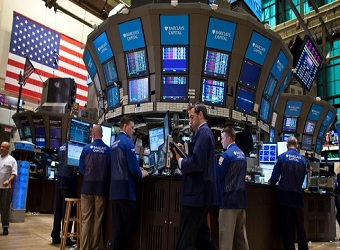The Dow Jones industrial average notched intraday and closing records Monday, adding to last week’s record-setting performance.
The 30-stock index rose 25.61 points to close at 22,118.42 with a lift from Boeing and Goldman Sachs, which contributed most of the gains. The Dow also posted its ninth straight record close.
The S&P 500 climbed 0.16 percent to close at 2,480.91, its first record close since July 26. The Nasdaq composite outperformed, rising 0.51 percent to close at 6,383.77.
The Dow posted record closing highs all of last week and gains as a stronger-than-expected earnings season carried on.
Calendar second-quarter earnings have grown 10.1 percent as of Friday, according to data from FactSet. S&P Capital IQ originally forecast earnings to grow by 6.2 percent.
“It’s really hard to see anything that could send the market for a stumble,” said Bruce McCain, chief investment strategist at Key Private Bank. “Earnings have been pretty good. … At some point we’re going to hit a roadblock but right now it’s hard to see what that will be.”
This week will be filled with retail companies releasing quarterly results, including Michael Kors, Macy’s and Nordstrom. Media giants Disney and News Corp are also slated to report this week.
Equities have had a stellar year. In 2017, the S&P and the Nasdaq have climbed 10.6 percent and 17.9 percent, respectively. The Dow has also advanced 11.8 percent entering Monday’s session.
“There is still juice left for equity investors,” said Andrea Cicione, head of strategy at TS Lombard, in a note. “Increasingly global US companies will benefit from a robust international economy even if a maturing US cycle holds back domestic nominal GDP growth. While other markets may outperform, it’s too early to throw in the towel on US stocks.”
Investors have been able to shrug off news about turmoil in Washington, especially within the Trump administration.
Wall Street has also been able to look past the lack of progress in tax reform, one of the key catalysts for the market after President Donald Trump’s election victory.
“Investors have greatly reduced their rather lofty expectations for tax reform and infrastructure spending; most now expect very little to come from congress,” said Jason Pride, director of investment strategy at Glenmede, in a note. “A common refrain is that at least policy is not getting in the way of the ongoing expansion or growth in corporate profits.”
Economic data have also been mostly positive lately. Last week, the Labor Department said the U.S. economy added 209,000 jobs last month, much more than expected. Wage growth, however, remained unchanged.
There are no major data due Monday, but St. Louis Federal Reserve President James Bullard said the central bank won’t need to raise rates in the near term. “The current level of the policy rate is likely to remain appropriate over the near term,” Bullard said.
Minneapolis Fed President Neel Kashkari said in a separate speech that immigration cuts proposed by the Trump administration will cut economic growth.
Source: CNBC


